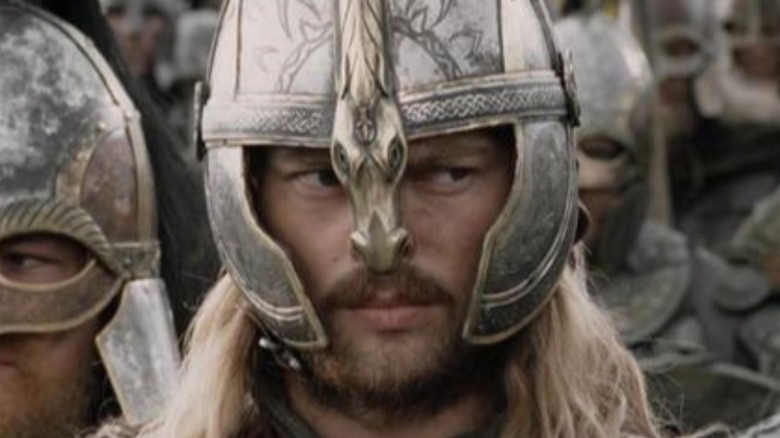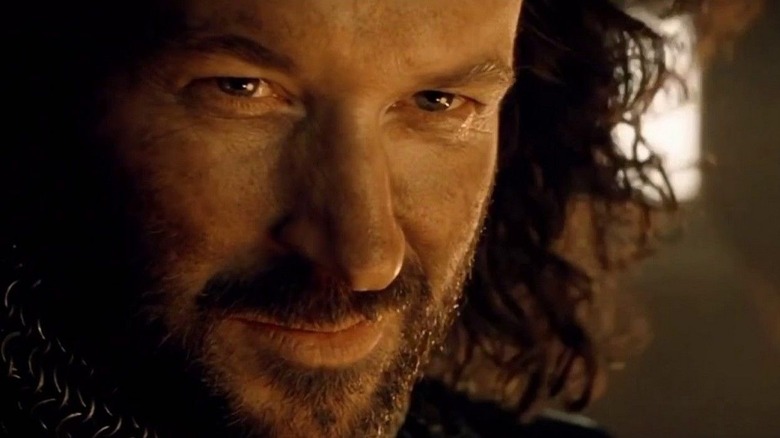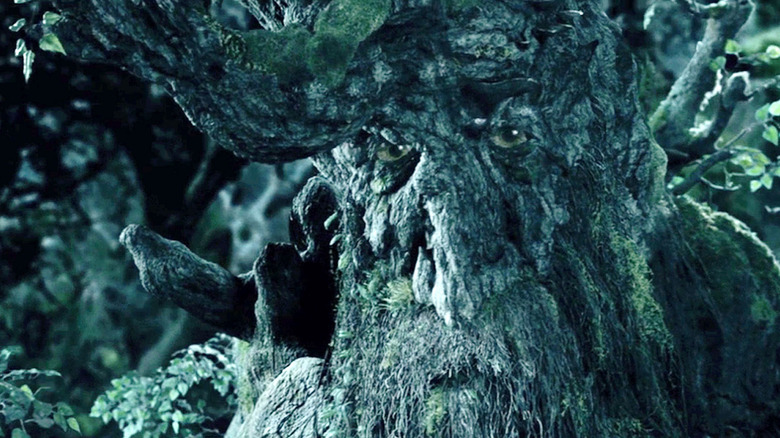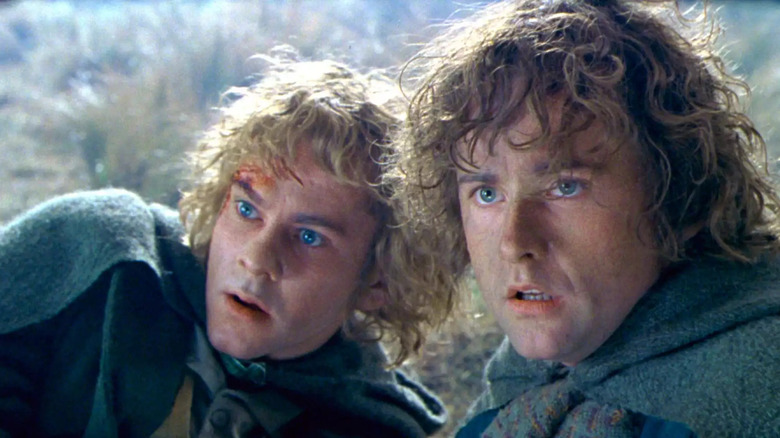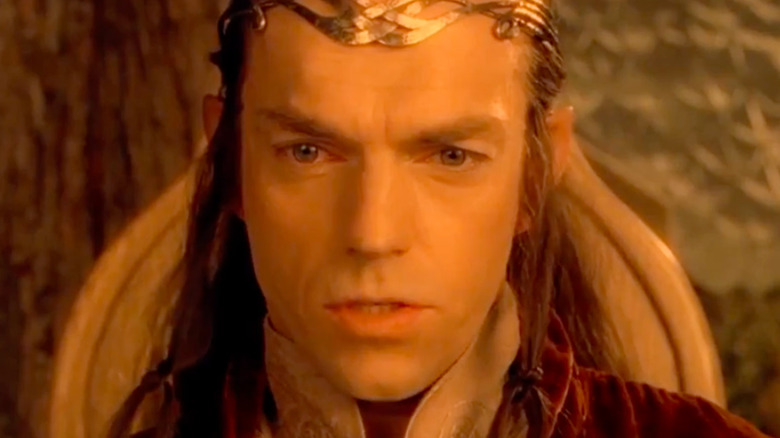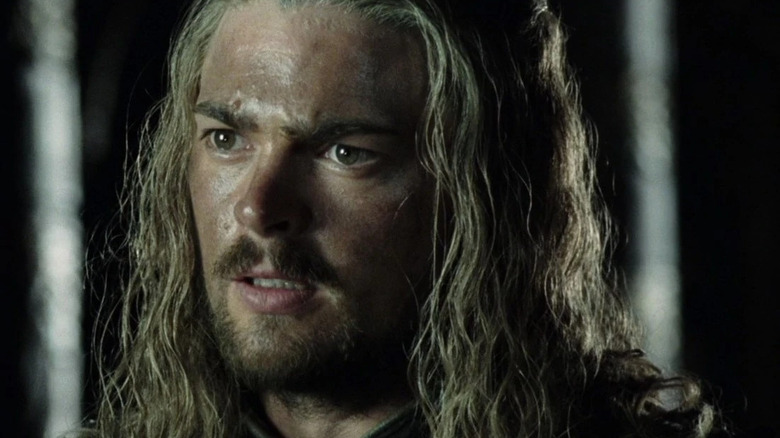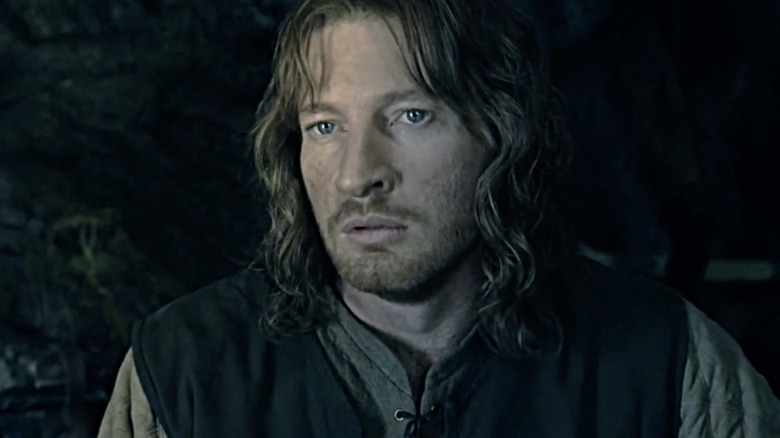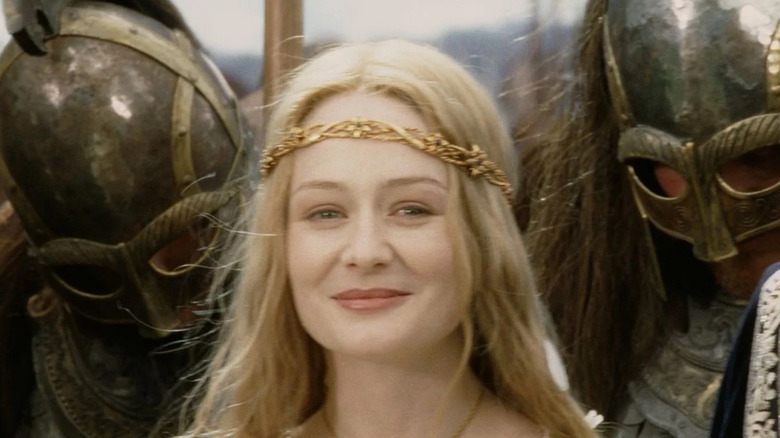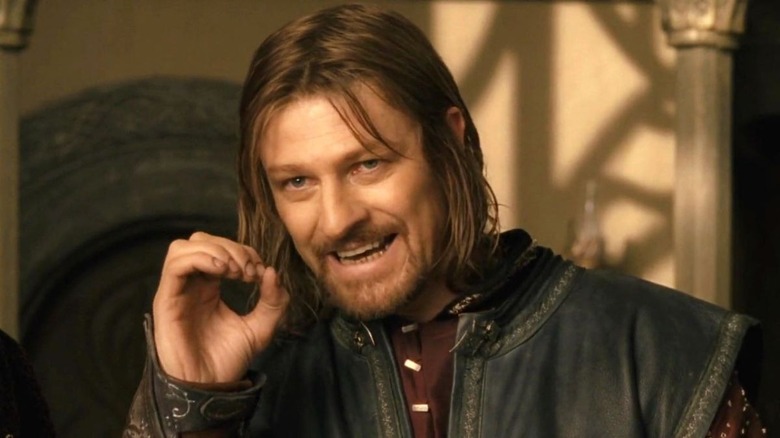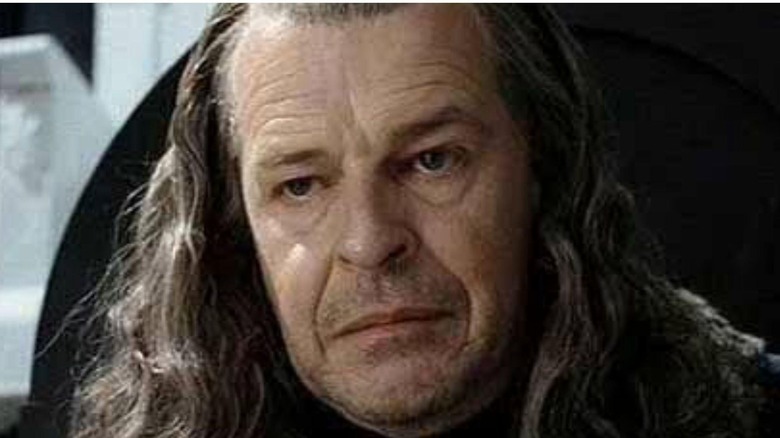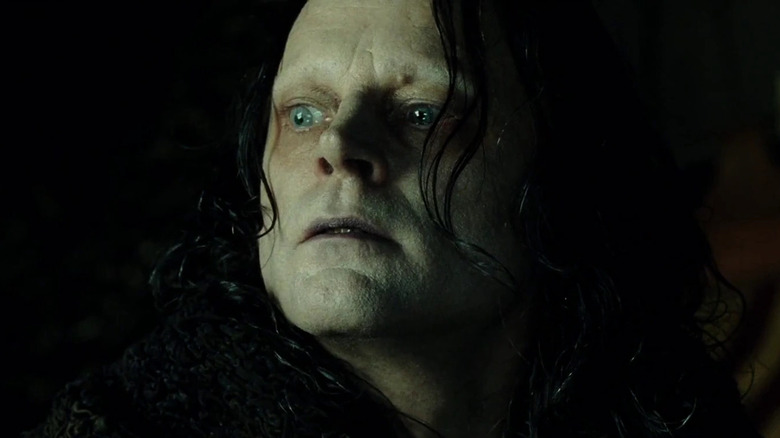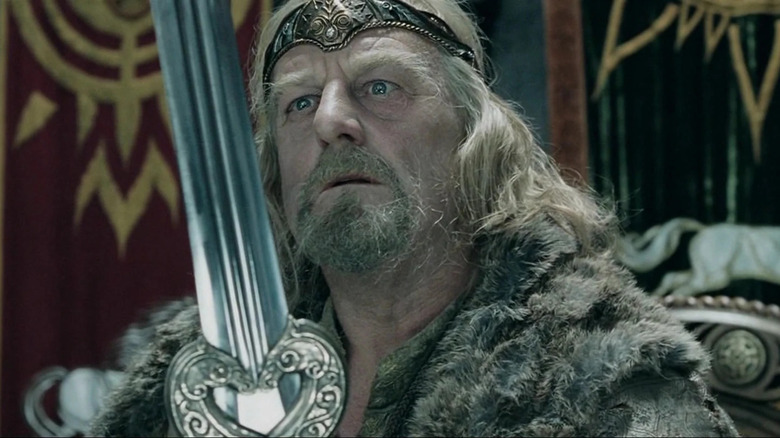The Most Underrated Lord Of The Rings Characters
If there are any film trilogies with more great characters packed into their runtime than "The Lord of the Rings" — based on J.R.R. Tolkien's globally beloved novels of the same name — then we'd love to see it. Frodo and Sam, Aragorn, Gandalf, Gollum, Saruman, Sauron, and countless other heroes and villains have to rank among the greatest and most talked about characters in the history of fictional storytelling.
But in any series featuring huge sweeps of fictional history, entire made-up countries, and countless high fantasy races and epic wars, lots of worthy characters get lost in the madness. So which "The Lord of the Rings" characters deserve a little more love and attention from fans? We've assembled a (decidedly nonexhaustive) list right here, featuring both god guys and bad guys. From Treebeard to Denethor and Grima Wormtongue to Merry and Pippin, these are the most underrated "Lord of the Rings" characters ever.
Isildur
The One Ring is known for controlling the other rings of power and giving its creator Sauron an edge in combat. But it has another trick up its sleeve — it gets into the head of its bearer and twists their mind, convincing them that they should keep and use it for their own interests. But like Aragorn says to Boromir in "The Fellowship of the Ring," "You cannot wield it. None of us can. The One Ring answers to Sauron alone. It has no other master."
If only his ancestor Isildur was aware of this. Isildur, of course, bested Sauron in combat thousands of years before the War of the Ring using his famed broken sword Narsil to sever the Dark Lord's Ring-bearing finger. He then took the Ring and followed Elrond to Mount Doom to destroy it, but it pulled its emergency trick, twisting Isildur's mind until he walked away with it. He was later killed in an ambush and dropped the Ring in a lake, where it was found by Gollum.
Isildur is almost seen as a villain, but we think he deserves a break here. He was ruined by the Ring, yes, but as we've seen in this series, most people — especially Men — would've done the same thing in his position. After all, it's likely the most powerful magical artifact in existence. Besides, the man is a literal Middle Earth hero who saves the world from Sauron for thousands of years. Perfect? No. Underrated? Certainly.
Treebeard
At the beginning of "The Two Towers," Merry and Pippin seemingly leap from the frying pan of Uruk-hai captivity and into the fire of being kidnapped by a giant walking tree who initially plans to kill them because he thinks they're orcs. They do manage to convince this slow-talking, ancient creature — an Ent named Treebeard — that they're not threats. But their attempt to get him and his Ent pals to attack Isengard isn't as successful. Treebeard insists it's someone else's fight and says two tiny creatures like them should go home before they get hurt.
Only when he sees the deforestation caused by an expansionist Saruman is he forced to acknowledge how much the world has changed for the worst, and not even the deep shadows of Fangorn Forest will save him from evil if he doesn't act. "Many of these trees were my friends," he says before turning his attention to Isengard, clearly visible since no trees remain to block the view. "Come, my friends. The Ents are going to war. It is likely that we go to our doom. The last March of the Ents." Like many other characters, Treebeard wants nothing to do with the war. But when it comes to him, he does what he has to do.
Bonus points for being, again, a literal walking, talking tree who steps on orcs like insects. Watching Saruman panic as he sees the Ent attack is one of the most satisfying shots of the series.
Merry & Pippin
The first thing we see Merry and Pippin do is terrorize Bilbo's birthday party with Gandalf's fireworks. Later, they join Frodo's adventure by accident after crashing into him while robbing a farm. When they meet Aragorn, they complain about missing meals and almost get everyone killed by starting a fire that attracts Ringwraiths they knew were hunting them. It makes no sense these two walking liabilities were permitted to join the Fellowship of the Ring and thus take part in the quest on which the fate of Middle Earth depends.
But they end up earning their spots and then some. First, they rally the Ents to war, leading to Saruman's defeat. Afterward, Pippin unwisely gazes into the wizard's palantir. But it's Sauron who gets the short end of the exchange by mindlessly revealing crucial information to Pippin regarding his plans to assault Minas Tirith (Pippin then informs the Allies). While fighting in this city, he helps save Faramir from his father, whose grief has driven him to madness. Meanwhile, outside the walls, Merry takes part in the charge of the Rohirrim — which turns the tide of war against Sauron — before helping Éowyn dispatch the Witch-king of Angmar. Yes, Merry Brandybuck, a drunken three-foot Hobbit, players a substantial role in the downfall of not one but two of Sauron's chief lieutenants.
The theme of Tolkien's story is that even the smallest people can change the world. Merry and Pippin exemplify this almost as much as Frodo and Sam.
Elrond
The heroes might be outgunned, but the one arena in which they have an edge is the quality of their high command. Even after Saruman defects to Sauron, the good guys still have Gandalf, Galadriel, and Elrond, not to mention countless able military leaders.
Elrond (Hugo Weaving), leader of the Elven haven Rivendell, is initially reluctant to help out. He makes it clear that the Ring cannot stay in Rivendell. Furthermore, since the Elves are actively departing Middle Earth, its defense would have to fall to its other species, and he's not hopeful about their prospects. In his words, Dwarves are obsessed with unearthing buried treasure and "care nothing for the troubles of others." When Gandalf mentions Men, Elrond — who watched Isildur fail to destroy the ring when he had the chance thousands of years ago — calls them a weak, failed race. Later on, he tries to discourage his daughter Arwen from trading her immortality for a marriage to Aragorn, pleading with her to leave Middle Earth with her people.
But actions speak louder than words. He heals a wounded Frodo, hosts the fateful council that produces the Fellowship of the Ring, and reforges Narsil, the broken blade that once cut the Ring from Sauron's finger. While delivering the weapon to Aragorn, he informs the future king of Gondor of the army of the dead, which Aragorn uses to crush Mordor's forces at the Pelennor Fields. He wants none of this. But when the time comes, he steps up.
Eomer
When we first meet Eomer in "The Two Towers," he's being banished from Rohan for his loyalty to the state, of all things. Saruman and Grima Wormtongue have no use for someone who can't be pacified, unlike his uncle, King Théoden. Even after being unceremoniously kicked out of the capital, he and his Riders of Rohan continue waging a guerilla war against Saruman's invading orcs. Then Gandalf finds him, and the two lead a day-saving charge at Helm's Deep that sweeps the besieging legions from the walls of the fortress. In "The Return of the King," he does it all again, leading a contingent of horsemen against Sauron's armies at Minas Tirith. With the War of the Ring concluded, it's safe to look back and acknowledge that without Eomer, none of Rohan's victories would have been possible at all. And without Rohan, the free people of Middle Earth would have almost certainly fallen under Sauron's iron fist. This makes Eomer arguably just as responsible for saving the world as any member of the Fellowship.
Played by Karl Urban ("Dredd," "Thor: Ragnarok," "The Boys") in one of his earliest roles, Eomer is exactly the type of friend you want beside you when it all hits the fan. He holds no grudges, works tirelessly on behalf of those he loves while demanding little appreciation in return, and can handle himself in a fight. In a world besieged by goblins, dark lords, and flying demons, loyalty like this goes a long way.
Faramir
Unless you live near goblins and wizards, there's not much for average folks to relate to in "The Lord of the Rings." It's escapist high fantasy, after all. But Faramir, played by David Wenham, is a tragic exception. His story of a man simply trying to please his father is painfully familiar to anyone who's ever been unfavorably compared to their siblings by a cruel, unloving parent.
All Faramir wants to do is lead Gondor's defenders against the besieging armies of Mordor. He's a fierce warrior and a capable leader, but there's only so much he and what appears to be fewer than a thousand men under his command can do against seemingly endlessly replenishable legions of Sauron's orcs, trolls, and wraiths. Denethor — Faramir's father, who's ruined by grief over the death of his other son, Boromir — lays the blame for Gondor's crumbling defenses singularly on the shoulders of his surviving son. At one tragic point in the third film, he even says he wishes Faramir had died instead of Boromir. We can empathize with Denethor's pain, but this is beyond the pale.
Audiences were especially appalled because we'd already seen sides of Faramir that his father was unaware of. Like his brother Boromir, he encounters Frodo and is in a position to take the Ring for himself. However, while tempted, he resists nobly, becoming one of the only humans in the entire series to do so. Without that inner strength, Frodo's entire quest could've fallen apart.
Éowyn
Like many action franchises, "The Lord of the Rings" is a man's man's man's world. Many movies with an almost exclusively male cast will have a token "Badass Female" character whose entire personality is that she's badass and female. But Éowyn, niece of Rohan's King Théoden, has a lot more going on than mere insulting tropes. To be fair, there are parallels with a more cliche archetype: She's in love with the lead, frequently gets whisked away into "womanly" roles when she wants to help fight (much to her irritation), and gets to say "I am no man!" right before ramming her sword through a tertiary villain's shrouded face. But the primary difference between her and more forgettable action heroines is that thanks to an excellent script and a stellar, underappreciated performance from Miranda Otto, Éowyn is a believable character who's easy to relate to.
Her best sequence is defying her uncle's order to stay behind while the men ride to war. Instead, she disguises herself as a warrior, secretly takes Merry with her (he was also ordered to sit out the fight), rides into battle, and nearly dies before defeating Sauron's chief lieutenant, the Witch-king of Angmar. How can you not root for a character like that?
Boromir
Most of the nine members of the Fellowship are pure good, with maybe one additional character trait (Frodo is afraid, Gandalf is wise, Gimli and Pippin are silly, etc.). It's not a slight against Tolkien — just an observation that he focused more on epic setpieces and the larger sweep of fictional Middle Earth history rather than deep, complex characterization. Noble heroes and mutilated villains serve this kind of story well. But the legendarium is big enough to fit in some exceptions as well.
Boromir, son of Denethor, steward of the throne of Gondor, is only in the series for the first chapter. But he's arguably the most complex character of the original Fellowship. In the extended editions of the films, we see via flashbacks that Boromir rivals Aragorn as a skilled, selfless, and noble warrior. He helps save Osgiliath (at least temporarily), defends his brother Faramir from their father, Denethor (who plays favorites), and then rides to Rivendell to investigate rumors that the One Ring has been found. There, it works its dark magic on him. He becomes convinced that the Ring can be wielded by Gondor against Sauron and infamously attacks Frodo in an attempt to seize it for himself. Then, weighed down with guilt, he sacrifices himself fighting to save Merry and Pippin, dying a tragic hero.
Again, arcs like this aren't particularly common in Tolkien's stories — characters tend to be either good or evil. But that just makes Boromir's fall and redemption stand out that much more.
Denethor
Most of the leaders our heroes encounter are wise and noble, willing to contribute what resources they can to the fight against Sauron. But Denethor, Steward of Gondor (a temporary caretaker of the throne in the absence of a king), can't be described so generously. When Gandalf and Pippin enter his court in "The Return of the King," they find him wracked with grief over the death of his son Boromir, to the point that he can no longer lead his besieged nation in a time of war. It's a situation that neatly parallels the initial state of Rohan's King Théoden in the previous film. But Théoden has the excuse of being under a brainwashing spell and never lets his grief interfere with his kingly duties once he is released from it.
Denethor, sadly, is no Théoden. He spends most of his time alone in his hall, lashing out at his remaining son, Faramir, whose qualities he cannot see or acknowledge. He also dismisses Gandalf's warning that Sauron's armies are headed his way by accusing him of simply trying to supplant him with Aragorn, the heir to the throne. He's a loathsome character, but also a tragic one that we'd pity if he wasn't so cruel to people just trying to help, and if so much wasn't needed from him in Middle Earth's darkest hour. John Noble's towering, criminally underappreciated performance elevates the character, turning him into one of the best movie villains of the 2000s.
Grima Wormtongue
Between Sauron, Saruman, the Mouth of Sauron, Gollum, the Witch-king of Angmar, the other Ringwraiths, the Watcher, the Balrog, Lurtz, Gothmog, Denethor, Shelob, Golgorim, Fellgorn-Amoz, and Ogrog, "The Lord of the Rings" movies have no shortage of excellent villains. Heck, we even made the last three up and you probably didn't even notice.
But there's one loathsome fiend who almost never gets his proper due: Grima Wormtongue. Slimy, manipulative, silver-tongued, and sickly pale, Grima was a former "man of Rohan" who fell under the wicked influence of Saruman the White. He betrays his country by helping the evil wizard brainwash King Théoden — who he serves as an advisor — into inaction while orcs plunder and pillage Rohan with impunity. When Saruman is exorcized from Théoden by Gandalf, Grima flees to Isengard, where he provides crucial insights into the design of Helm's Deep, which Saruman's forces later storm. When this attack fails, Grima stabs the wizard in the back before getting shot and killed by Legolas. His impact on the story at large is considerably larger than the limited attention his character gets.
But that's not why he's on the list. He's here because actor Brad Dourif absolutely slays as this unlovable "witless worm," as Gandalf addresses him. Every mannerism, facial twitch, and line of dialogue is delivered to grotesque perfection. Endless comments have been shared about who gave the best performance in the films. We think Dourif deserves to be in the conversation.
King Théoden
"The Lord of the Rings" has almost as many heroes as the MCU. Some have literal magic powers. Others are such skilled fighters that they might as well have magic powers (does plot armor count?). But Middle Earth is also filled with ordinary folks who rise up against overwhelming evil when destiny demands it. In fact, that's arguably the central theme of Tolkien's legendarium, and the inclusion of powerful characters makes the weaker ones look more heroic for contributing their efforts at all. Hobbits are the best example of this, of course, but Rohan's King Théoden deserves to be part of the discussion too.
Played mightily in the films by Bernard Hill, Théoden is an impotent ruler when we meet him. Saruman has placed him under a brainwashing spell to give his forces the upper hand as they storm through Rohan. But after being restored by Gandalf, Théoden leaps into action. He gets his people to the safety of Helm's Deep, takes part in its (barely successful) defense, and rallies his exhausted people for a desperate, tide-turning, and impeccably timed counterattack against Sauron's armies at Minas Tirith, dying nobly in the process.
At no point is he ever unnaturally strong or brave. At different times he exhibits fear, despair, grief, and bitterness at the failure of his friends to come to his aid. In other words, he is human, which makes his unwillingness to do nothing in the face of evil even nobler.
